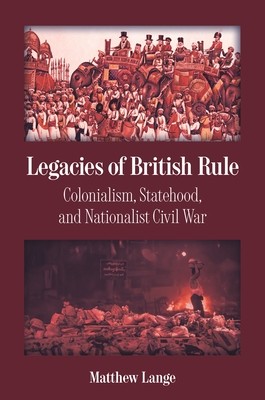
- We will send in 10–14 business days.
- Author: Matthew Lange
- Publisher: Princeton University Press
- ISBN-10: 0691274509
- ISBN-13: 9780691274508
- Format: 15.6 x 23.4 x 1.7 cm, minkšti viršeliai
- Language: English
- SAVE -10% with code: EXTRA
Reviews
Description
The relationship between colonial pluralism and nationalist civil war in former British colonies
Why do some communities fight civil wars over national self-rule while others do not? In Legacies of British Rule, Matthew Lange offers insight into this question through a rigorous multimethod and comparative analysis that pinpoints the combined impact of precolonial statehood and British colonialism. During transitions from empire to nation-state, postcolonial officials in places with large and long-standing precolonial states commonly try to build a unified nation around the dominant community in ways that discriminate against and exclude smaller communities. While such national chauvinism can fuel reactions leading to nationalist civil war, a history of British colonialism intensifies these reactions by increasing sensitivity to national chauvinism and empowering communities to act. Consequently, nationalist civil wars are three times more common in former British colonies than in other former overseas colonies. And yet, Lange finds that British colonialism exerts a very different effect on places with a limited history of precolonial statehood; in an environment with little national chauvinism, British colonialism deters nationalist civil war by promoting more inclusive postcolonial states that strengthen plurinationalism and limit fear and anger over reduced communal autonomy. Lange's account provides valuable new insights into the roots of nationalist civil war, broad patterns of conflict, and the mixed effects of colonialism and pluralism.EXTRA 10 % discount with code: EXTRA
The promotion ends in 22d.14:50:01
The discount code is valid when purchasing from 10 €. Discounts do not stack.
- Author: Matthew Lange
- Publisher: Princeton University Press
- ISBN-10: 0691274509
- ISBN-13: 9780691274508
- Format: 15.6 x 23.4 x 1.7 cm, minkšti viršeliai
- Language: English English
The relationship between colonial pluralism and nationalist civil war in former British colonies
Why do some communities fight civil wars over national self-rule while others do not? In Legacies of British Rule, Matthew Lange offers insight into this question through a rigorous multimethod and comparative analysis that pinpoints the combined impact of precolonial statehood and British colonialism. During transitions from empire to nation-state, postcolonial officials in places with large and long-standing precolonial states commonly try to build a unified nation around the dominant community in ways that discriminate against and exclude smaller communities. While such national chauvinism can fuel reactions leading to nationalist civil war, a history of British colonialism intensifies these reactions by increasing sensitivity to national chauvinism and empowering communities to act. Consequently, nationalist civil wars are three times more common in former British colonies than in other former overseas colonies. And yet, Lange finds that British colonialism exerts a very different effect on places with a limited history of precolonial statehood; in an environment with little national chauvinism, British colonialism deters nationalist civil war by promoting more inclusive postcolonial states that strengthen plurinationalism and limit fear and anger over reduced communal autonomy. Lange's account provides valuable new insights into the roots of nationalist civil war, broad patterns of conflict, and the mixed effects of colonialism and pluralism.

Reviews